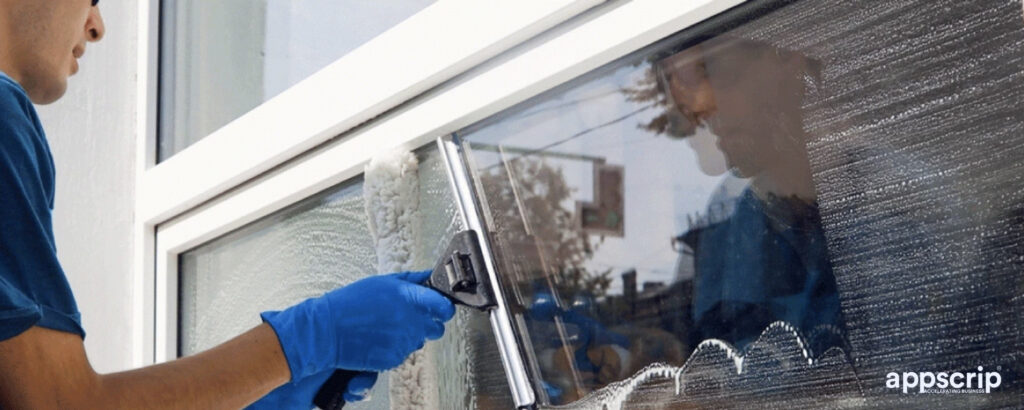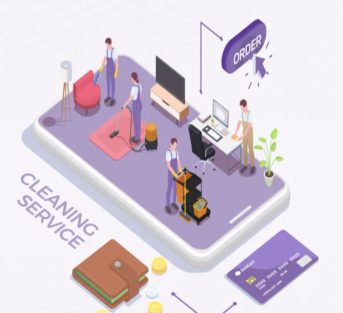Entrepreneurs are excited launching a business when they’re confident the niche they’re foraying into offers consistent growth. Professional cleaning services is such a domain, as cleanliness is not only a necessity but also a priority for organizations of all sizes.
Offices aim to maintain a clean and safe environment to comply with regulations, boost employee morale, enhance productivity, and create a welcoming atmosphere for clients. This is reflected in the global commercial cleaning services market, valued at $343.34 billion and projected to grow at 6.6% annually.
North America currently holds the largest share of this market, offering good growth opportunities. However, having the right tools to manage operations, such as a software solution, is vital, especially when the business grows.
A software solution like a cleaning app can help enhance operational efficiency and customer satisfaction while enabling a seamless operation.
This is where Appscrip comes in. Our Cleaning Services Software can automate billing, communications, and marketing to ensure success. Schedule a demo to learn how Appscrip’s cleaning services software works.
Office Cleaning Businesses – Why Start One?
The office cleaning industry is not a tough nut to crack and offers generous returns with several benefits for new entrepreneurs. We shall detail how to start an office cleaning business, but firstly here’s why an office cleaning business is worth your consideration:
1. Consistent Demand:
A clean office space bolsters the looks of an office. It also enhances the perception of clients and gives employees a feel-good factor while working. However, offices may find it difficult to employ cleaners, supervise them, and justify such investment over time. This creates a steady demand for reliable cleaning businesses.
2. Low Startup Costs:
Compared to launching many other businesses, startup costs for a cleaning business are much lower. To kick off, you just need basic cleaning supplies, necessary equipment, reliable transportation, and minimal staff. So, entrepreneurs with limited capital can easily afford to start such a business.
3. Flexible Business Models:
You can customize your services to fit your client’s needs, like offering daily, weekly, specialized services or deep-cleaning packages. Invest only in necessary equipment depending on your services and buy supplies as needed. You can even increase staff as and when your business grows.
4. Recurring Revenue Streams:
Always make efforts to convert one-time clients to long-term customers. Offer lucrative deals on yearly or monthly packages and draw office cleaning contracts. Perform your services as best as possible to be assured of regular renewals. Thus, you can benefit from a regular income stream without investing too much in marketing.
5. Room for Growth:
One way to grow is by expanding your services. Offer solutions like window washing, move-out cleaning, carpet cleaning, or eco-friendly solutions. By catering to broader customer needs, you project your firm as a comprehensive solution provider in the cleaning domain. Word of mouth and referrals are among the cleaning business marketing strategies that are needed for growth.
6. Pandemic-Driven Awareness:
The COVID-19 pandemic was an eye-opener for most of us, even for businesses. It heightened the awareness of workplace hygiene. Maintaining a spik and span surrounding using office cleaning services is a need. And companies are more than willing to invest in such services to ensure long-term benefits.
What started as a chore just to sweep floors and empty trash bins has brought about a paradigm shift in how the office cleaning business is perceived these days.
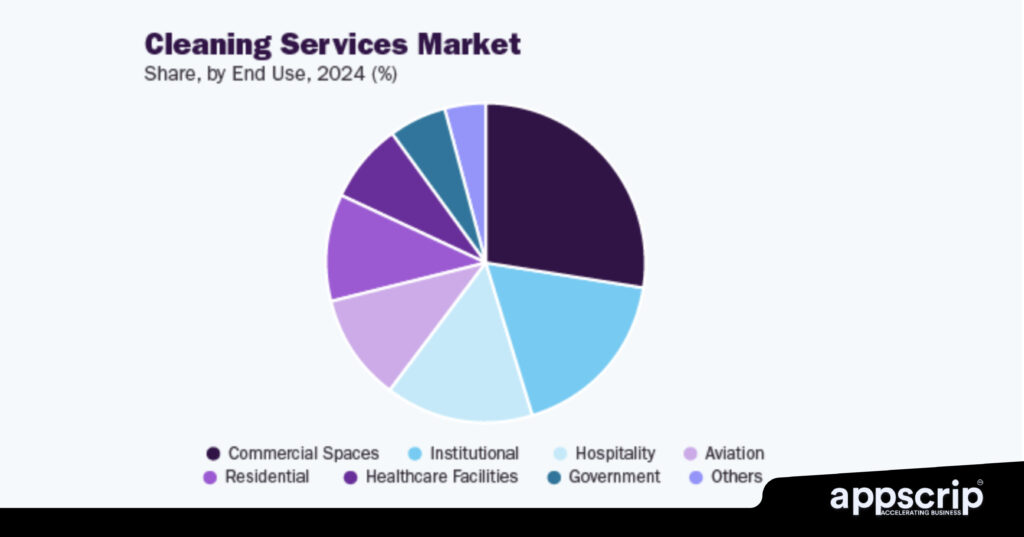
Cleaning Services Market Report – Share by end-use
What Do You Need to Start a Cleaning Business?
The basic requirements while launching an office cleaning business are a business plan, necessary licenses and permits, liability insurance, cleaning equipment and supplies, a marketing strategy, and trained staff.
Also, research your local market for client needs and the latest cleaning processes. Here’s what you’ll need in detail:
1. A Business Plan
A well-thought-out business plan mentions your goals, mission and vision, target market, pricing strategy, marketing approach, and financial projections. These will ensure you stay on track, and they can also help secure funds if needed. Your business plan should answer the following:
- Who are your target clients (Corporate offices, SMBs, coworking spaces)?
- What services do you offer (basic cleaning, deep cleaning, specialized services)?
- What is your USP, or what sets you apart from the competition?
2. Legal Requirements
- Register Your Business: When you register your business, decide on a business structure you prefer, options being sole proprietorship, LLC, partnership, etc. Also, register with the appropriate authorities (local or state).
- Obtain Licenses and Permits: Licenses or permits vary as per location. Firstly, you might require a general business license, then a cleaning service license, and permits like one for handling chemicals or waste disposal.
- Insurance: Liability insurance protects against legal hassles and financial pitfalls. Insurance will protect you and your business when mishaps occur, or you incur any damages. It also builds trust with clients, especially when they know there’s coverage in case of unforeseen circumstances.
3. Equipment and Supplies
The quality of your tools and supplies will have a telling effect on the final outcome of your work. Of course, your staff’s skill is the primary requirement, but the right tools will ensure that a job is done well. So invest in high-quality cleaning supplies and tools. Cleaning equipment essentials include:
- Mops, vacuum cleaners, and microfiber cloths
- Glass cleaners, disinfectants, solutions, and surface cleaners.
- Gloves, masks, and safety gear for your staff
- Equipment to wash carpets, clean floors, or window washing.
4. Marketing and Branding
Branding and marketing are essential elements for long-term success. Develop a brand identity, as it will build trust with clients. Branding includes:
- A business name and logo that can be easily remembered and identified
- A simple website, an app, and social media presence. Reach out to your clients on the medium they’re to showcase your services.
- Printing business cards, flyers, or brochures to reach the local community is also imperative.
- Do not forget technology. Adopt digital marketing strategies like Google Ads or local SEO to get relevant clients.
5. Staff Recruitment and Training
When you launch an office cleaning business, you can begin with just one or two staff members on your rolls. But as your business grows, recruit others so your clients know you have qualified, well-experienced staff.
Provide training per industry standards on cleaning techniques, SOPs, soft skills, customer service, and workplace safety. This not only ensures customer satisfaction but compliance with local or state laws.
6. Pricing Strategy
Pricing strategy is key to success. It also ensures getting copious business and being profitable. Your rates must be competitive based on market conditions, the competition, materials used, and client perception of the work being performed. Using tax accounting software for small businesses, track costs, manage finances, and adjust prices based on the financial data and profitability.
Conduct market research by analyzing the competition and their rates. Get to know your cost or breakeven before setting prices. There are various pricing models like charging per square foot, hourly charges, seasonal discounts, offers for regular customers, or clubbed service packages. Offer detailed quotes when clients demand one.
Your pricing strategy should ensure you don’t charge too high and lose clients or keep it so low that you are underselling yourself and cutting your profits. Also adjust your rates as and when the market conditions demand it.
Consider using residential proxies during your market research to anonymously scrape competitor websites for accurate and up-to-date pricing data, ensuring you have the insights needed to adjust your rates effectively.
7. Customer Management
Consider technology to cater to tech-savvy clients and for the advantages it presents. When you include an app, you ensure that mundane administrative functions are taken care of while you concentrate on satisfying your clients by ensuring quality work is done.
An app can automate several functions, enhance customer satisfaction, and improve operational efficiency. The app can also manage client schedules, invoices, and feedback efficiently.
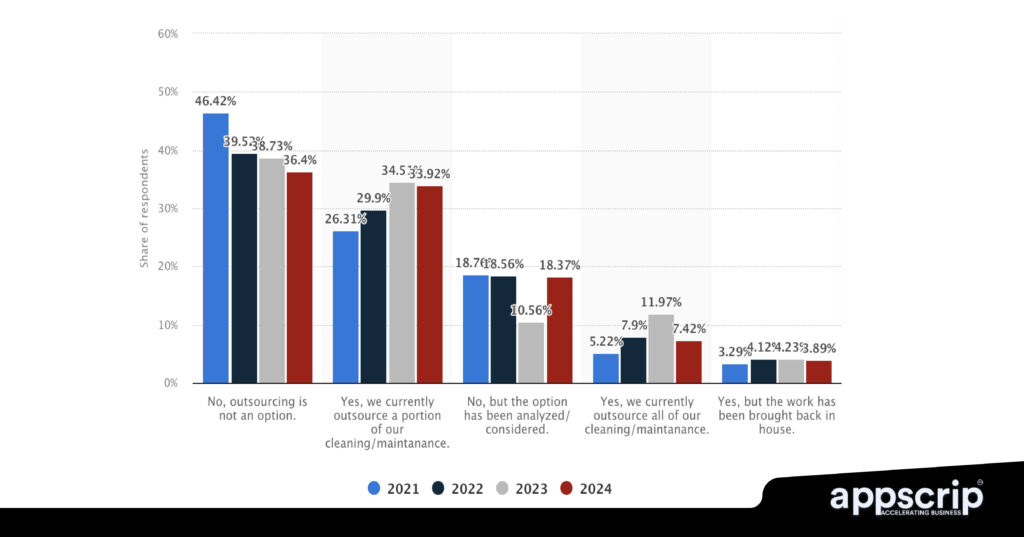
Outsourcing of cleaning services by facility managers in the US from 2021 to 2024
Key Steps to Launch Your Office Cleaning Business
To launch an office cleaning business, research your market, choose a niche (SMBs, large offices, customer-oriented industry, servicing a particular domain), define your services, select a name, register your business, obtain licenses and insurance, acquire equipment, set pricing, and have a marketing strategy.
Follow these key steps to ensure a smooth start:
1. Conduct Market Research
Before launching any business, research the options available in your area. Identify key pointers such as:
- What’s the demand for office cleaning services in your region?
- Knowing your competition is key. Check out their marketing strategies, social media presence, and pricing structure.
- Study local businesses to understand their cleaning needs.
- Find the pain points that clients face.
Market research helps you identify your USP and the services you can launch. Research your competitors to identify how to better them and differentiate your offerings.
2. Choose a Niche and Define Your Services
Choose a niche, like specific services you want to specialize in, or are you looking to cater to general office cleaning needs? Offer services such as:
- Basic cleaning (vacuuming, dusting, trash removal).
- Deep cleaning (carpet shampooing, window washing).
- Sanitization services (post-pandemic disinfection).
Also, consider offering eco-friendly cleaning solutions to attract environmentally conscious clients.
3. Register Your Business and Get the Required Licenses
Choosing a business structure that aligns with your goals is imperative, options are sole proprietorship, partnership, LLC, etc. Then, register with the appropriate authorities. Also, ensure to acquire:
- A business license.
- General liability insurance.
- When you hire staff, procure worker’s compensation insurance.
- Certifications (for handling specialized cleaning equipment or chemicals).
4. Purchase Equipment and Supplies
Invest in high-quality, professional-grade cleaning tools that the manufacturer covers. Also, look to purchase proven supplies or even eco-friendly cleaning products. Plan to buy in bulk for better deals and negotiate the prices. Some essentials include:
- Vacuum cleaners, microfiber clothes, mops, and brooms.
- Disinfectants, solutions, multi-surface cleaners, and glass cleaners.
- Safety gear like gloves, masks, and goggles.
- Software for managing client schedules, invoicing, and customer communications.
5. Set Competitive Pricing
There are several strategies you can adopt for pricing. Pricing is among the most essential strategies you must work out, as it can make or break your business. Determine your rates based on the following:
- The size of the cleaning area (per square foot pricing).
- The frequency of cleaning (daily, weekly, or monthly).
- The complexity of tasks (basic, deep cleaning).
- Equipment to be used and supplies consumed.
- Time taken to complete the tasks.
- If the services are one-off or regular jobs.
Consider offering discounts for long-term contracts.
6. Build Your Brand and Market Your Business
Creating a brand presence is imperative for your business, as this helps build trust and will bring in more clients. Marketing is another key activity that will ensure healthy revenue growth. Steps for branding include:
- Design a logo that points to your niche and is innovative. Don’t forget business cards, flyers, and brochures either.
- Creating a website is vital. Search for most services begins on the internet, so include details about your services, pricing, and contact information.
- Leverage local SEO to appear in SERPs for terms like “office cleaning services near me.”
- Network with property managers, other cleaning businesses, and office administrators to generate leads.
7. Focus on Customer Service
Among your most significant assets are your customers. Keeping them satisfied with your service is imperative. The first step in this process would be to deliver excellent service. This will help you retain clients and build word-of-mouth referrals.
Be consistent in your work, communicate clearly on work done, procedures adopted, and materials used for transparency, and address client feedback promptly.
8. Comply With Local Regulations & Safety Standards
Awareness and following local laws regarding cleaning chemicals, waste disposal, and employee safety is imperative. Your staff should be trained adequately on safety procedures and handling hazardous materials.
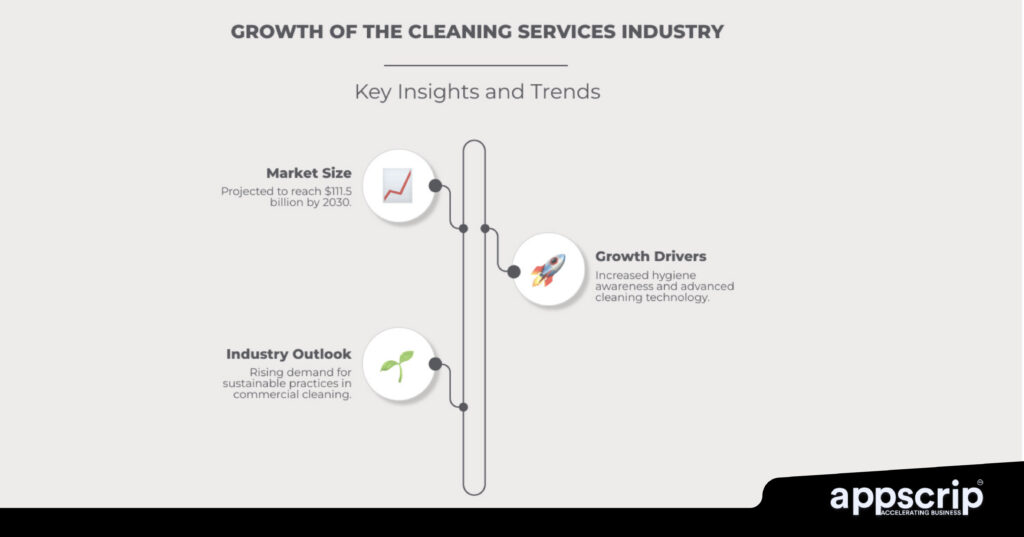
How to Define Your Office Cleaning Business Model
An office cleaning business model is a company’s structure and strategy to deliver cleaning services to office spaces, including how to get clients, generate revenue, and sustain growth.
The business model shows how a company will operate, generate revenue, and meet client needs.
Here’s how to define it:
1. Identify Your Target Audience
Without the generous help of clients, a business cannot thrive. So, firstly, identify your target audience. Focus on businesses that need your services. For instance:
- Small offices or startups with basic cleaning needs.
- SMBs looking for consistent cleaning contracts.
- Large corporate offices or coworking spaces need such services.
Example:
If there’s a tech hub, look for startups and coworking spaces. They usually lack dedicated cleaning staff but prioritize cleanliness.
2. Choose Your Revenue Streams
Revenue generation is imperative for any business. Strategize the means you will use to generate income. There are several options, such as:
- Subscription-based Contracts: Subscriptions can be based on weekly or monthly packages for cleaning services.
- One-Time Services: There could be clients looking for one-off services, like an occasional deep cleaning.
- Specialty Add-Ons: Be ready to carry out specialized services, which will add to your reputation. This could include carpet cleaning, construction cleanup, window washing, or sanitization.
Example:
- Offer subscription contracts to firms that are looking for bi-weekly cleaning services, such as consultants, clinics, chartered accountants, law firms, etc.
- Keep in touch with real estate agencies for one-time deep cleaning services before client visits.
3. Determine Your Cost Structure
Knowing your fixed and variable costs helps determine your profitability. Fixed costs include insurance, licenses, and equipment, while variable costs include cleaning supplies and labor.
Example:
If your monthly fixed costs include:
- Equipment leasing: $500
- Cleaning supplies: $300
- Insurance: $200
Your monthly revenue would be $4,000, with 10 clients on contract paying $400 monthly. The profit can be worked out once you work out the fixed and variable costs.
4. Establish Operational Processes
Streamline operations and create SOPs to improve efficiency:
- A software solution can help schedule and manage client appointments.
- Use cleaning checklists and SOPs to ensure consistent service quality.
- Train staff to handle equipment and interact professionally with clients.
Example:
Use a cleaning software solution (such as Appscrip’s) to automate client scheduling and send automated reminders for appointments or feedback surveys.
5. Incorporate Value-Added Features
Create a USP that will help differentiate your business from the competition by offering services such as:
- Green cleaning services using eco-friendly products.
- Accommodate client needs through flexible scheduling.
- Offer a satisfaction guarantee policy and work as per client requirements to build trust.
Example:
Implement ‘Green Certifications’ for your services and display it. Include “Eco-Friendly Services” to attract environmentally conscious clients. Explain the benefits of using such products for clients.
What Makes Commercial Cleaning Services Different From Residential Services?
Commercial cleaning services differ from residential cleaning due to the area involved in the cleaning, larger spaces like offices or retail stores vs individual homes. Then, due to the frequency of cleaning (often daily or weekly for commercial vs. occasional for residential), specialized equipment and cleaning solutions used for commercial spaces, and the need to work after business hours for commercial cleaning operations.
We detail the differences:
1. Scope of Work
- Commercial Cleaning: Commercial cleaning involves offices, warehouses, or retail stores, which are usually large spaces. Most of the tasks would be routine and could include cleaning restrooms, staff rooms, breakrooms, sanitizing high-touch regions, and disposing large volumes of waste.
- Residential Cleaning: Residential cleaning is more personalized, with cleaning services that satisfy individual homeowner needs, such as cleaning bedrooms, kitchens, garages, storerooms, and bathrooms.
2. Equipment and Supplies
- Commercial Cleaning: Commercial cleaning equipment could be heavy-duty and industrial-grade, like heavy-duty vacuums, floor polishers, and more potent disinfectants. These would be capable of working longer hours efficiently and in poor conditions.
3. Client Relationships
- Commercial Cleaning: Here, you would be dealing with business owners, office managers, or facility coordinators of various businesses. There would be contracts in place that could be long-term, with the scope of work clearly mentioned.
- Residential Cleaning: Here, you would be dealing with homeowners or property managers. It could be a one-time or lighter work that should be handled carefully. The job would involve personal spaces and as per individual needs and preferences.
4. Scheduling
- Commercial Cleaning: Commercial cleaning would be preferred to be handled outside regular business hours like early mornings, evenings, or weekends. This would be to avoid disruptions and downtime to business operations.
- Residential Cleaning: This would be preferred during the daytime to not inconvenience the residents. Or sometimes even during weekends so that the owners are around to provide access or pass instructions.
5. Pricing Models
- Commercial Cleaning: The pricing structure for commercial cleaning would be fixed based on the area to be cleaned, work involved, frequency of service, supplies needed, and equipment to be used. There would be contracts in place with the scope of work mentioned clearly.
- Residential Cleaning: The price for home cleaning would be a flat rate fee, but if the work involved has specific instructions, it could be higher or charged on an hourly basis. There would be flexibility offered on a case-to-case basis to satisfy homeowners, receive feedback, and look for referrals.
How to Choose the Best Legal Structure for Your Business
Choosing the proper legal structure is vital for your office cleaning business as it would impact tax obligations and liabilities. The legal structure involves sole proprietorship, LLC (limited liability company), and partnerships. Each has its unique advantages and considerations, which we shall detail for you:
- Sole Proprietorship: Solo entrepreneurs should ideally opt for this structure as it is straightforward, simple, and cost-effective. The business belongs to you, and your revenue is included in your tax return.
- Limited Liability Company (LLC): The most significant advantage is its liability protection for personal assets. This structure is for those looking at long-term operations, hiring employees, and scaling big time. Then, with LLC, there’s also flexibility in management and taxation.
- Partnerships: This is tailor-made when more than one person wants to launch a business. It’s perfect for co-founders or investors aiming to launch a business jointly. In partnerships, profits, liabilities, and decision-making are shared. However, make sure to have a clearly drawn-out partnership agreement to avoid disputes.
How you go about choosing the proper legal structure is strategic. This is vital because this will decide your liability, taxation, and management responsibilities. We shall break it down for you:
1. Assess Your Business Goals and Resources
If you plan to go solo, with limited investment, and aim for simplicity, a sole proprietorship is advised. However, if you aim to expand to various regions, a Limited Liability Company (LLC) offers better protection for your personal assets (especially when you scale).
2. Consider Your Liability Risk
There are risks involved in a cleaning business, like property damage, client injuries, or employee lawsuits. If you are contracted to clean high-investment spaces (corporate offices) and structures like an LLC or corporation, it is best to shield your personal assets from risks and liabilities.
3. Tax Implications
Sole Proprietorship: You are taxed on the revenue you generate, which is accounted as your personal income.
LLC: Businesses don’t have to pay tax when it is below a certain threshold. Hence, the advantage is profits are taxed only once, unlike corporations that are in a double taxation bracket.
4. Ownership and Management Preferences
Partnerships: This is perfect when one person may not be able to handle all the responsibilities. Hence, the partners can split duties and take care of functions that are under their supervision. One partner might focus on operations while the other takes on marketing and client acquisition.
Corporations: This is when there are investors on board and there are plans to go big and raise significant capital to expand geographically.
5. Regulatory Requirements
Corporations require a high amount of documentation and annual reporting. While an LLC or sole proprietorship involves less paperwork and reporting.
Decision Flow In Each Structure:
- Sole Proprietorship – Starting small with minimal liability.
- LLC – Offers limited liability protection and flexibility
- Corporation or Partnership – Planning to launch with partners or with funding.
Advantages Of a Sole Proprietorship for Cleaning Businesses.
A sole proprietorship is the simplest structure and is popular among cleaning businesses. Here are the key advantages:
Ease of Setup: Starting out involves minimal paperwork and low investment. Tailor-made for first-time entrepreneurs.
In most US cities, you can register a business with the Secretary of State and obtain a cleaning license for $50-$100.
Complete Control: You are the sole owner with the authority to make any decision, from pricing to marketing.
If a client requires more work like sanitization or deep cleaning, you adjust the prices add terms right there, and get on with the job. There’s nothing like approvals from higher-ups.
Tax Simplicity: Your personal tax return includes what you earn or spend. There’s no complexity of corporate taxes.
If you earn $50,000 profit in one year, you pay income tax and self-employment tax on it.
Direct Profits: You are the sole owner of the profits. You don’t have the liability to share it with anyone (partners or shareholders).
Flexibility: It’s not too tricky to adapt, alter, or change your course. But if you decide to include residential cleaning services to add variety to your service, so be it.
But remember, personal liability is your nemesis. If you damage a client’s property and are sued, your personal assets could be at risk.
Considerations for LLCs and Partnerships to Manage Risks.
Why Consider an LLC?
An LLC offers liability protection with flexibility in taxation and management.
- Liability Protection: Personal assets are shielded from (business) debts or lawsuits, as mishaps may occur while working. If an employee accidentally damages a client’s personal item, the client can sue the LLC, but your house and savings are safe.
- Partnership Risk Management: Partnerships can survive only on trust and a well-written agreement. Profit sharing, roles, responsibilities, and conflict resolution should all be clearly detailed in order to mitigate disputes.
- Professional Image: Unlike sole proprietorships, clients and vendors would trust an LLC or formal partnership, giving you the professional edge.
- Tax Flexibility: LLCs can choose the tax structure they prefer. They can be taxed as a sole proprietorship, partnership, or corporation.
- Scalability: Expanding or roping in investors is easier being an LLC or partnership; there’s a more structured option for growth.
- Pass-Through Taxation: Profits are taxed only as personal income. When you profit $70,000, you pay taxes as an individual and not a corporate tax.
- Credibility and Growth Potential: LLCs appear more professional and can end up contracting large commercial cleaning contracts. A retail company would sign a long-term cleaning contract with an LLC, not an individual.
Assess your goals, risk appetite, and financial condition to select the legal structure that suits your office cleaning business mission and vision.
When Partnerships Work Well
When two or more individuals are ready to share responsibilities and risks, a partnership is the right option.
1. Combine Expertise: When 2 or more individuals with different skill sets are ready to come together and work, the company profits from their efforts.
Example: One partner could focus on customer acquisition and the other on operations and hiring. This ensures both use their skill to ensure smooth operations.
2. Shared Financial Responsibilities: When you launch a business, the initial investment would be a burden for one person. Even buying equipment and supplies could be financially tough; here, you can split your bills and mitigatea financial crunch.
Example: For a $10,000 initial investment, each partner can contribute $5,000, reducing their burden.
3. Clear Partnership Agreement: When you kick off the venture, detail each one’s responsibilities, how you will share profits, and handle disputes in writing to avoid conflicts.
Example: Specify who handles client acquisition and who oversees staff training. Also, details how profits are split.
Risk Management for Partnerships
Risk management for partnership involves identifying, evaluating, and tackling issues that could arise between partners like financial instability, different goals, poor communication, legal issues, and exit strategies.
The aim is to protect each one’s interests and ensure the partnership becomes successful.
Risks can be:
Financial risks: Unequal contributions, debts, individual financial instability.
Operational risks: Poor decisions, unclear roles, inefficient workflows, reliance on individuals.
Strategic risks: Market fluctuations, regulatory changes, competitor actions, shifts in customer needs.
Legal and Personal risks.
Developing mitigation strategies:
Contractual safeguards: Clear agreement outlining roles, responsibilities, revenue sharing, exit strategies, and dispute resolution.
Communication protocols: Regular meetings, channels for communication, and clear decision-making processes.
Financial controls: Financial transparency, budgeting, risk diversification.
Insurance coverage: Business insurance will cover liabilities.
Dispute resolution mechanisms: Include Arbitration or Mediation clauses.
Performance monitoring: Reviews goals and KPIs regularly.
How to Set Up Your Operation and Hire Staff
1. Build a Professional Online Presence
- Create a simple, SEO-optimized website showcasing your services, pricing, testimonials, and certifications.
- Example: Include a free office cleaning estimate form and a blog with relevant content.
- Leverage social media platforms like Facebook, Instagram, and LinkedIn to reach local businesses.
- Example: Post-before-and-after cleaning photos and share tips for office hygiene.
2. Offer Introductory Discounts
Attract clients by providing first-time discounts or free add-on services.
- Example: Offer free carpet steaming in the reception with a full month’s office cleaning contract.
3. Use Local Advertising and Networking
- Advertise in local newspapers, trade publications, and community hotspots. Attend business networking events and join relevant groups.
- Example: Keep in touch with property managers or coworking spaces, as they typically offer more extended contracts.
4. Request and Display Reviews
Encourage satisfied clients to leave reviews on Google, social media, or your website.
- Example: Provide offers like 10% off on the next job for such reviews.
5. Scale by Expanding Services
- Diversify offerings to include carpet cleaning, window washing, or eco-friendly cleaning solutions.
- Example: Add “deep-cleaning packages” for clients looking for sanitization standards.
Best Strategies to Market and Expand Your Cleaning Business
The below-mentioned strategies will not only help you market your office cleaning business effectively but also provide opportunities for long-term growth and expansion.
1. Build a Strong Online Presence
- Create a Professional Website: A website can showcase your services, features, pricing, USP, client testimonials, and contact details. Now, potential clients can find you online. In fact, you can also make it possible for clients to schedule a consultation or service easily by providing a booking form on the website.
- Leverage Local SEO: Optimize the website and GMB profile with relevant keywords to rank in local search.
2. Use Social Media Effectively
Social media platforms are proven tools to build brand awareness and engage with an audience.
- Showcase Before-and-After Content: Before and after images/posts / videos have a good following. Post the work done by your team to highlight your quality of service. Share cleaning tips and stories of your team on social media to enhance your brand.
- Run Targeted Ads: Platforms like Facebook and LinkedIn are perfect for running targeted ads. You can target office managers or SMB owners in your area.
3. Offer Competitive and Creative Promotions
Offers are something that attracts new clients and retains existing ones:
- Introductory Discounts: Provide discounts for first-time clients. You could offer to provide an onsite estimate to market your services.
- Loyalty Programs: Offer discounts or a free service after hitting several services to reward and retain loyal clients like a deep cleaning free for 6 months of cleaning contract.
4. Network and Build Partnerships
Collaborate and expand your network.
- Partner with Property Managers: Be in the good books of property managers, real estate agencies, or coworking spaces. They can get you bulk contracts. Provide incentives like referral bonuses to property managers if they can bring in new clients.
5. Focus on Client Retention
Satisfied clients can take you further than no other; they’re your best marketers.
- Provide Personalized Services: A cleaning assignment will always have special requests, meet those unique needs, and make your customers loyal for life.
- Ask for Reviews and Referrals: Satisfied or happy clients will never hesitate to recommend your services. Ask for Social Media or LinkedIn reviews, too.
6. Utilize Technology to Streamline Operations
An app can help you manage bookings, make secure payments, and enhance client communication to increase operational efficiency.
- Use Cleaning Management Software: Automate scheduling, invoicing, and reminders.
With tools like Appscrip’s Cleaning Services Software, you can make your operations effective and deliver a fantastic customer experience.
7. Monitor Competitors and Trends
Have an eye on the competition; that will provide you with lots of valuable insights. Stay updated on industry trends.
- Adopt Innovations: If competitors use specialized cleaning equipment or methods, assess whether incorporating similar innovations can benefit your business.
8. Invest in Branding and Reputation Management
Clients are attracted to a renowned brand with a good reputation.
- Develop a Memorable Brand: A professional logo, a funky tagline, and consistent brand activity can do wonders to your branding.
- Manage Online Reviews: Respond to reviews—both positive and negative promptly. Thank the positive ones, and for the negative one,s promise to look in and make amends.
9. Focus on Employee Training and Professionalism
Your employees are your brand ambassadors; invest in their training and development.
- Conduct Regular Training: Train staff on cleaning techniques, equipment handling, safety protocols, and soft skills. Uniforms and ID badges promote professionalism and add to visibility with clients.
FAQs: How To Start An Office Cleaning Business
1. Is Liability Insurance Mandatory for Office Cleaning Businesses?
Liability insurance is highly recommended, though it isn’t legally required. It helps to protect against claims like property damage or injuries caused during your services.
- Example: If a client’s laptop is damaged during cleaning, liability insurance covers the cost, saving you from financial loss.
2. What Licenses Are Needed to Start a Cleaning Business?
Most US states require a general business license to operate a business. While some states demand a specialized cleaning or janitorial license for the domain. Check local regulations for more info.
In NYC, to run an office cleaning business, you need a general business license, and if hiring employees, you’ll have to register for an EIN.
3. What Is the Average Investment Required to Start a Cleaning Business?
The investment in your business depends on a lot of factors. But as a ballpark figure: For a small operation, the average investment would be $2,000 to $5,000 – this includes cleaning supplies, licenses, insurance, and marketing.
But for larger businesses, handling more clients and doing more work every week would require $10,000 to $25,000 for supplies, industry-grade equipment, and staff.
Conclusion: How To Start An Office Cleaning Business
You don’t have to break the bank to launch an office cleaning busines,s and there’s steady demand expected to grow as the economy rises. You can target SMBs or extensive corporate facilities, but focus on delivering high-quality services consistently to build trust, loyalty, and a healthy clientele.
Starting an office cleaning business can be financially rewarding if you approach it with a professional attitude. Focus on delivering exceptional service and maintaining client relationships to ensure long-term success.
As your cleaning business scales, inculcate technology for operational efficiency and automating mundane functionalities.
Appscrip’s Cleaning Services Software is just what you need to meet the needs of the cleaning industry. Our solution helps you automate operations, manage client communication, help with invoicing and feedback collection, and offer secure payment options, which is needed to succeed in the competitive cleaning industry.
Take the first step today: get in touch.

